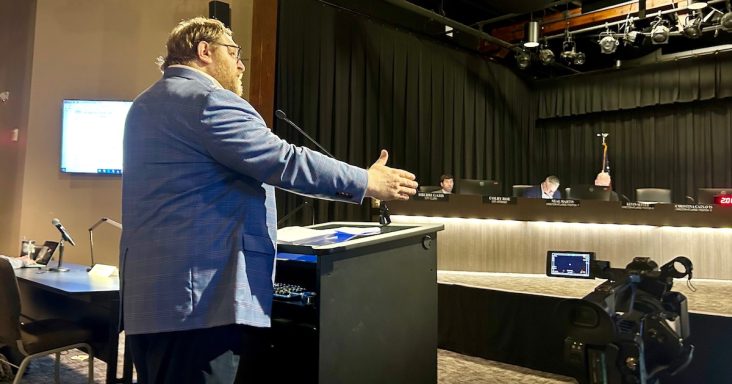Fort Smith Board approves 2024 water rate increase, holds off on 2025 rate plan
by July 11, 2024 8:21 pm 842 views

City of Fort Smith Finance Director Andy Richards discusses water revenue and expense numbers with the Fort Smith Board of Directors prior to Thursday’s (July 11) vote on a proposed water rate increase.
The Fort Smith Board of Directors on Thursday (July 11) at a special meeting approved a water rate increase that will start Aug. 1 but put off a second increase for 2025. Customers using 3ccf of water in a month, the majority of customer bills, rates would go up about $2 a month.
A water bill for 3ccf of use is $11.81, and with fees and taxes added it’s $13.37. The new rate increases will bring that bill to $13.98 or $15.75 with fees and taxes, according to city information. Customer’s will have the new water rates added to their monthly utility bill, which also includes sewer and solid waste charges.
The proposal before the board Thursday night was for two rate increases, one to start in August, and a second that would raise the rates again Jan. 1. The proposed second increase would bring the common bills to $19.05 or $21.30 with fees and taxes. The board chose to put off a decision on that increase until later in the year.
The increase will also raise rates for commercial and industrial water users in the city as well as contract users outside the city.
The board has postponed making a decision on a rate increase that Utilities Director Lance said at the first of the year was necessary, wanting more information and making sure citizens have all the details on the proposed new rates.
Because of the delay, the increase, which when originally proposed would make certain the city could cover its operating expenses and cover debt service ratios needed to comply with the bond covenants, will now not cover what is needed by the city. Andrew Richards, the city’s finance director, told the board Thursday that the 2024 rate increase alone will not raise the necessary revenue to cover the city’s debt service requirements.
The city has approximately $180 million worth of revenue bonds outstanding. When those bonds were issued, an authorized ordinance indicated that the city will maintain net revenues available for debt service at 110% of what the city’s operation and maintenance expense and debt service requirements are, Richards said.
In 2023, the city only raised 108% in revenues. For the first six months of 2024, utility department revenues were $2.916 million short of covering expenses even though the sewer department was $1.707 million in the black, he told the board. The rate increase will not allow the city to make the needed 110% in 2024, but a second increase in January would allow the city to reach that in 2025.
“A single rate increase will not fix the problem,” Richards said. “It is too late in the year to make up that difference.”
He said had the rate increase gone into place at the first of the year as suggested by a rate study conducted by Burns & McDonnell in 2023, the city could have covered the needed revenues.
If the city does not meet the debt service requirements, it can lead to credit downgrades for the city, a negative outlook for the credit and bond community, billing for credit monitoring, and potential legal actions by bond holders, which could include them taking over the city’s water billing.
“The decision we have to make tonight that we have with consequence delayed isn’t one about popularity. It is about responsibility, and it’s about leadership,” said Director Jarred Rego. “Do we want the headlines in this community to continue to say things like progress, growth and expansion? Or do we want them to say words like default, downgrade and debt covenance? We have to act.”
The board agreed to have a special meeting July 16 before the scheduled study session to consider raising the qualification for Project Concern, the city’s utility assistance program, be raised from 165% of the Federal Poverty Guidelines to 200% in order for more citizens to qualify for reduced utility bills. The program allows for qualifying citizens to receive a 50% discount on water and sewer services and a 25% discount on solid waste services.
Directors George Catsavis and Kevin Settle voted against the increase.
